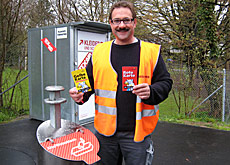
Zurich commune shows spitting the red card

A small commune near Zurich has become the first place in Switzerland to make spitting in public a payable offence.
The fines are part of Wallisellen’s new clean-up programme which also involves the issuing of yellow and red “warning” cards to offenders.
“This is the event of the century. Super!” was one comment on the commune’s website which seemed to capture local sentiment.
“I hope others follow your example so I won’t have to avoid spit or litter when I walk on the streets,” it added.
The “punitive” clean-up programme, which was launched at the beginning of the year, is taking place in two phases.
Following an initial information and awareness campaign, in which yellow warning cards are sent to the offending residents, a second stage will start in June with the yellow cards turning red – accompanied by a relevant fine.
Anyone caught spitting or littering will have to pay a SFr30 ($36.50) penalty, while leaving dog excrement on streets will cost SFr80. Similar penalties were introduced in Basel in January 2006 for littering (SFr50) and for allowing dogs to foul the streets (SFr100).
Alexandra Taverner, from Wallisellen’s rubbish collection department, said that most local people seemed happy about the new rules, which have taken several years to introduce.
Taverner said they were implemented as soon as the commune was given the go ahead: “We first wanted to know if these measures, like other legislation we introduced, were legally viable.”
High costs
The Association of Swiss Cities estimates that littering costs communes with over 10,000 inhabitants around SFr100 million ($82.3 million) annually – or 20 per cent of their overall public highways budget.
“It is not down to public authorities to pay for the negligence of just a few,” said Christian Schütz, head of Wallisellen’s public roads department.
Schütz said it shouldn’t be difficult to catch people – they have sufficient resources as a fifth police officer will soon be patrolling the commune with the specific aim of helping to keep the streets clean.
Municipal police head Christian Clavadetscher says he expects police work to become simpler.
“We already have the authority to issue fines, but we must then press charges. Now the system will be more direct,” he said.
But Niels Michel, director of the campaign collective that coordinates anti-littering campaigns, warned that the fine system was a double-edged sword.
“Basel has only fined 11 people in a year. It’s nearly impossible to catch offenders. The idea has boomeranged: those who don’t want to do anything can always say it’s useless.”
For Schütz the “Clean Wallisellen” programme is already having a positive effect.
“Those who claimed that people could still be properly educated if we left rubbish around realised they were wrong. Dirtiness encourages dirtiness and cleanliness encourages cleanliness,” he said.
swissinfo, based on a French article by Ariane Gigon Bormann in Wallisellen
A plan of action was launched in Wallisellen at the beginning of 2007 in line with new “clean-up” legislation.
It includes the replacement of the bulky recycling containers with smaller units equipped with underground reservoirs. Sensors indicate when the containers are four-fifths full so that service personnel can empty them.
At the same time, people may be fined for spitting, dropping litter or allowing their dogs to foul the streets.
Wallisellen used the German city of Frankfurt as a model, where the authorities boast that cleanliness has “improved considerably” due to the anti-litter programme.
Social attitudes towards spitting have changed greatly in western Europe since the Middle Ages. Then frequent spitting was part of everyday life and it was thought ill-mannered to suck back saliva to avoid spitting.
By the early 1700s spitting became viewed as a habit which should be concealed, and by 1859 many considered spitting on the floor or street as vulgar, especially in mixed company.
Spittoons were used openly during the nineteenth century to provide an acceptable outlet for people to spit. They became far less common after the influenza epidemic of 1918 and their use has since virtually disappeared.
In Singapore spitting in public can result in a $1,000 fine.

In compliance with the JTI standards
More: SWI swissinfo.ch certified by the Journalism Trust Initiative

























You can find an overview of ongoing debates with our journalists here . Please join us!
If you want to start a conversation about a topic raised in this article or want to report factual errors, email us at english@swissinfo.ch.